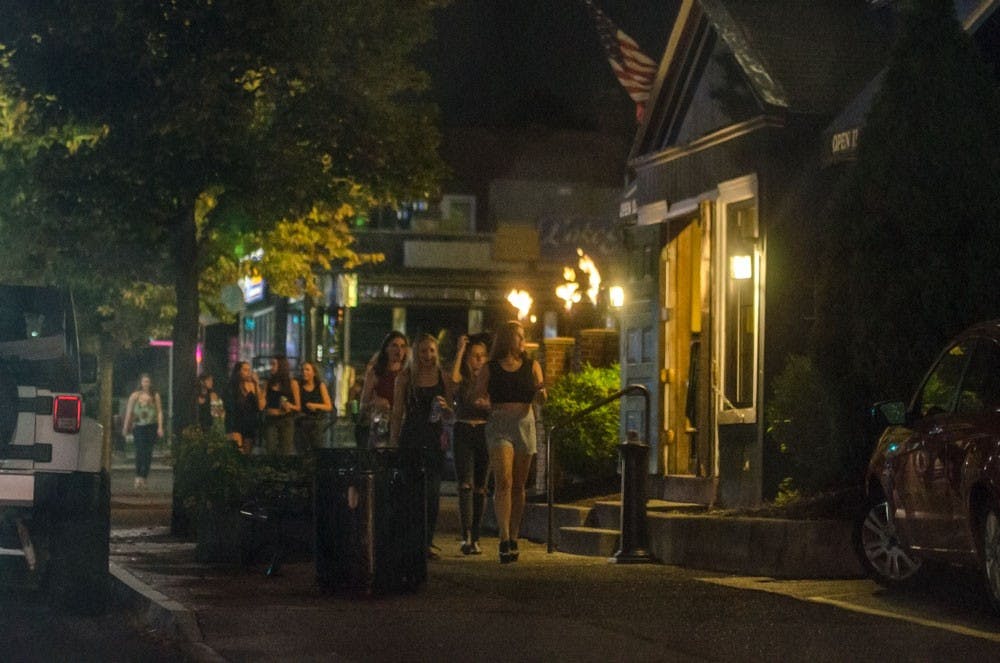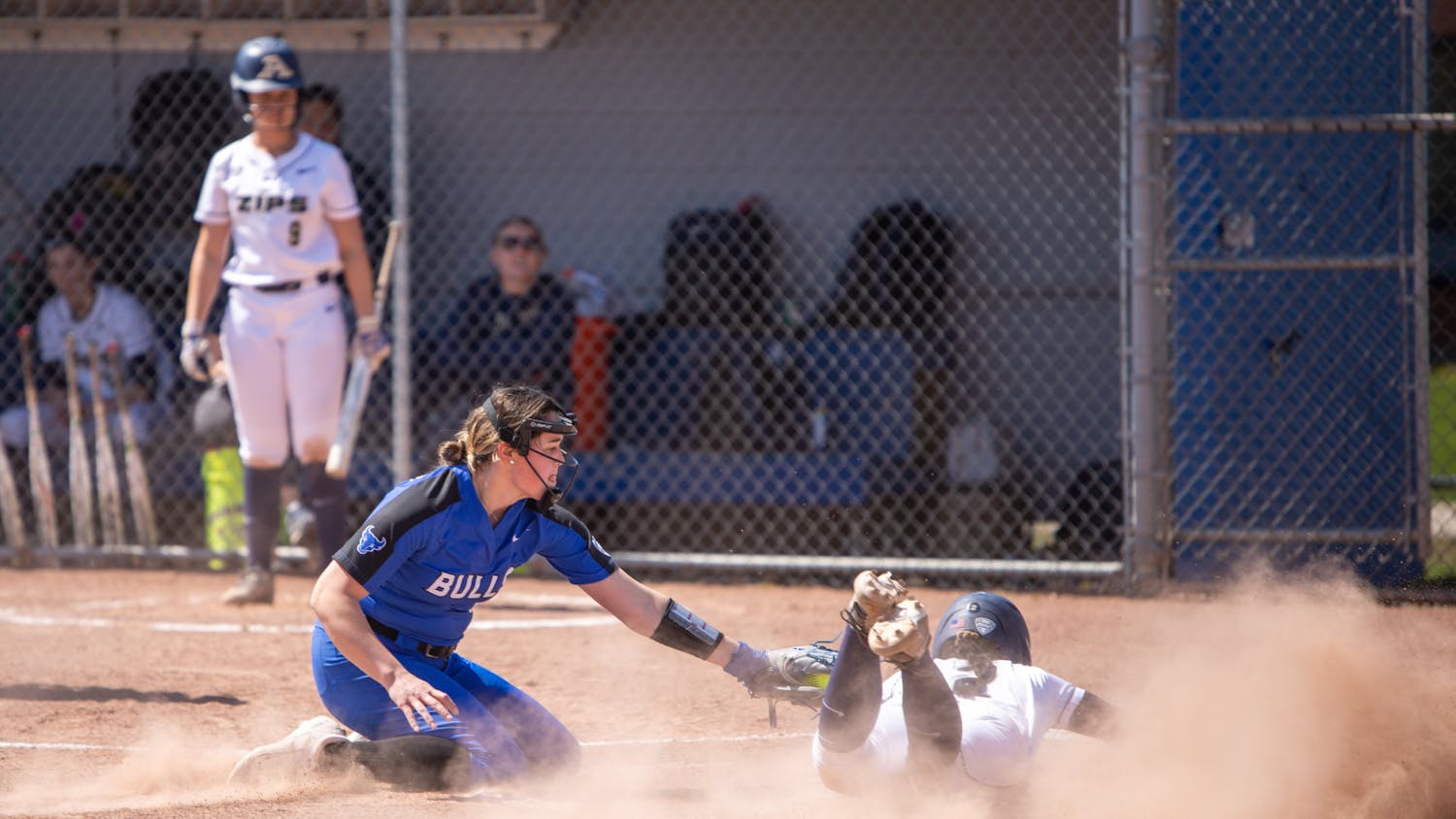In 2010, four people were shot and killed outside of the City Grill in downtown Buffalo around 2:30 a.m.
Erie County Clerk Chris Jacobs cited this incident as one of the reasons why Buffalo bars should close at 2 a.m. instead of 4 a.m.
On Wednesday, Erie County Legislator Ted Morton, R-Cheektowaga, announced a proposal to change Erie County bar closing times to 2 a.m. in hopes of decreasing alcohol-related deaths and injuries. If a majority of Erie County legislators approve the proposal, the New York State Liquor Authority would then need to approve it in order to enact the legislation.
And if the proposal became law, it would have a far-reaching impact – from bars owners to local residents to local college students like those at UB.
Matt Mauriello, a junior communication major, doesn’t agree with the proposal because he feels that it will lead to more parties and open container violations because students will be searching for a place to go out.
There’s been increased attention on UB students and their nightlife options this semester, with the university disciplining 57 students during the first few weeks for underage drinking and house parties in the University Heights neighborhood off South Campus. Some have blamed the large number of house parties on the lack of nightlife options for students.
Jacobs told The Spectrum Thursday this is a topic he’s felt “strongly about for a good while.” He first gave his support to an earlier closing time in an open letter during the summer.
Buffalo, Saratoga Springs and Albany all currently have a last call time of 4 a.m. New York City has a last call time of 4 a.m. as well, but clubs and bars can stay open after that without serving alcohol.
Jacobs said Buffalo is an anomaly because of its late closing time and the discussion of “aligning with other counties” is important since the late driving time poses a danger to the driver and others on the road.
Because the law says last call is at 4 a.m., Jacobs said patrons don’t need to leave right at that time and will often wait until 5 or 5:30 a.m. to leave, which is when some people are leaving for work.
“It gets dangerous the later you’re out,” Jacobs said.
Jacobs said it’s the right time for a discussion, since he believes the last time this topic was brought up was in the ’80s.
He also said many downtown residence groups – such as residents in the Allen town district – have expressed their concern with robberies and sexual abuse cases stemming from the late night bar outings.
But Tim Walton, a promoter for several Buffalo clubs and bars, said the change will cause a loss in revenue for businesses and will negatively affect employees who rely on the nightshift to get by.
“It’s not a broken system,” Walton said. “Don’t fix something that’s not broken in the first place.”
Walton, who owned the bar District for a year and was the former assistant manager for Lux, said because there are two different “crowds” of people who go out, there will be a loss of business.
“The CEO won’t want to have a glass of wine with the college student having a shot at the bar,” Walton said.
UB students who spoke with The Spectrum were torn in how they feel regarding the proposed change.
Emily Andrews, a senior communication major, said she wouldn’t be affected by the change in times because she doesn’t go to bars that often. But she said the reasoning behind the proposal might do just the opposite of what lawmakers are hoping.
“I think it might increase the drunk driving rate, but it can go both ways,” Andrews said. “If the bars close at 2 a.m. that gives drivers less time to sober up than if the bars stay open until 4 [a.m.]”
Devin Kiblin, a senior accounting major, said he understands that the change is an attempt to “keep young adults safe,” but he doesn’t agree with the proposal.
“Closing bars early does not necessarily mean that people will not drink as much
or stay out as late,” Kiblin said. “Regardless of what time a bar closes, people are still bound to get too drunk and act stupid or violent.”
Kiblin also said that closing bars earlier could lead to patrons drinking alcohol at a faster rate than they normally would.
But Jacobs said a decrease in the hours alcohol is served would actually decrease fatalities.
“Over 30 percent of vehicle fatalities are alcohol related,” Jacobs said.
He also said a majority of those victims are younger individuals, ranging from 18-30 years old.
Other students said they agree with legislators and think bar closing times should be earlier.
Patrick Heumegni, a junior psychology and sociology major, said he thinks if bars close at 2 a.m. it will allow people to be safer – especially women.
“I believe that it’s actually right to close the bars at 2 a.m. if it’s for the safety of everybody else,” Heumegni said. “If a woman’s going home at 4 in the morning drunk a lot of people will try to take advantage of her, especially guys.”
Myles Montgomery, a junior communication major, also agrees with this proposal. He said he thinks people get “crazy late at night” which is why there’s so much crime.
“There’s nothing good that happens after 2 a.m.,” Montgomery said. “When the lights go out, there’s nothing good out there.”
With Buffalo seeing an increase in residents moving downtown, Jacobs said this proposal is something he looks forward to discussing, but “there’s still a long way to go” before change is potentially made.
Marlee Tuskes is a news desk editor and can be reached at marlee.tuskes@ubspectrum.com. Follow her on Twitter at @marleetuskes5.





